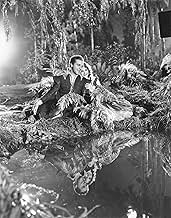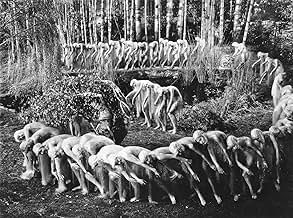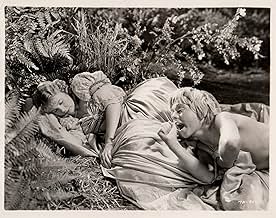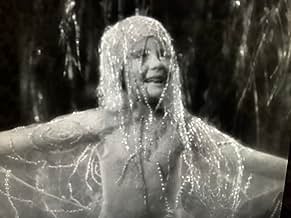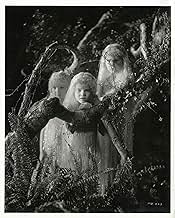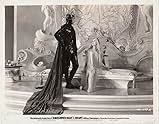CALIFICACIÓN DE IMDb
6.8/10
4.1 k
TU CALIFICACIÓN
Dos parejas y un grupo de actores tienen un encuentro con unas traviesas hadas en el bosque.Dos parejas y un grupo de actores tienen un encuentro con unas traviesas hadas en el bosque.Dos parejas y un grupo de actores tienen un encuentro con unas traviesas hadas en el bosque.
- Dirección
- Guionistas
- Elenco
- Ganó 2 premios Óscar
- 6 premios ganados y 2 nominaciones en total
Olivia de Havilland
- Hermia - In Love with Lysander
- (as Olivia de Haviland)
Nini Theilade
- Fairie - Attending Titania
- (as Nina Theilade)
- Dirección
- Guionistas
- Todo el elenco y el equipo
- Producción, taquilla y más en IMDbPro
Opiniones destacadas
10artzau
Thalberg's pledge to give back to the people something good is seen in this project realized 66 years ago. Everyone is acting! No one struts or swains, dying to be a star. The young, superlovely Olivia de Havilland is a gorgeous and fun Hermia in her maiden role. Dick Powell and Ross Alexander as the two Athenian youths confused by Puckish Mickey Rooney Robin Goodfellow are wonderful in their entanglement with beautiful Jean Muir's Helena. The players, Frank McHugh, Dewey Robinson, Hugh Herbert, Grant Mitchell and the wonderful snob's snob, Arthur Treacher are topped by Jimmy ("you dirty rat") Cagney [trivia buffs know he never said those lines except in response to Gorshen and Rich Little's impressions of him at a roast before his death] and Joe E. Brown's Flute. Victor Jory, often cast as a villain is great as Oberon, as is lovely Anita Louise as Titania. There's not a weak spot in this cast and the entire play, in living Black and White, is soft, diffused and whispery as a summer night. Erich W. Korngold's music is supplemented by the exquisite Mendelssohn score and look for a tiny Billy Barty as Mustardseed, one of the sprites. There are other fine ones, the RSC's 1968 and the recent 1999 are wonderful, but, fans, take it from an old Shakespeare buff, this one is an immortal production.
The movie is dated, true. In fact, seeing 30's Hollywood's version of Shakespearian England's version of Athenian costuming is a delight in itself. But the actors in this rendition are just amazing. Not only is the cast impressive (Cagney, Brown, Rooney, D'Havilland, Powell), but they are doing the roles with the right mixture of buffoonery and dedication to Shakespeare's love of high and low comedy together.
The casting of Cagney as Bottom was brilliant, his mixture of swagger and obliviousness is perfect, especially when played off of the great Joe E. Brown, who's rubber faced quiet performance is uproarious. Young Mickey Rooney is a wonderful puck, light and athletic, it may be his finest work. The special effects manage to give off the feeling of faerie, without overpowering what is going on. And the weaving of the two stories together works as well as might be hoped for.
I consider this to be the classic definitive Midsummer's Night Dream films. No other can ever measure up.
The casting of Cagney as Bottom was brilliant, his mixture of swagger and obliviousness is perfect, especially when played off of the great Joe E. Brown, who's rubber faced quiet performance is uproarious. Young Mickey Rooney is a wonderful puck, light and athletic, it may be his finest work. The special effects manage to give off the feeling of faerie, without overpowering what is going on. And the weaving of the two stories together works as well as might be hoped for.
I consider this to be the classic definitive Midsummer's Night Dream films. No other can ever measure up.
Since "Shakespeare in Love" made that particular playwright happening and new, check out this, Warner Bros.' wild, expensive, free-wheeling adaptation of "A Midsummer Night's Dream".
For me, James Cagney makes the movie. He's Nick Bottom, the leader (or so he believes) of a traveling troupe of actors. He gives an invigorating performance--the screen is his. At one point, he gets to wear a donkey's head (if you know the play, you know what I'm talking about), but it doesn't faze him in the least. Cagney, the most energetic screen actor, doesn't let his over-the-top approach mar his skill or care with The Bard's great words. It's the test of anyone wishing to act out a part in a Shakespeare play, which Cagney passes, to "speak" the dialogue, and by doing so, make what might be confusing on the page understandable to audiences on the screen or stage.
Warner really spared no expense with this production, which I think might have been the costliest of that year. The whole affair is like a dream in every way--it seems to sway in the wind, fragile to the touch. It features Mendolssohn music, soft-white photography (the great Hal Mohr), and some of the most incredible sets and costumes you're likely to see in a 1930s film.
Nominated for three Academy Awards: Picture, Cinematography and Editing. Bested by "Mutiny on the Bounty" for the first, it won the other two.
For me, James Cagney makes the movie. He's Nick Bottom, the leader (or so he believes) of a traveling troupe of actors. He gives an invigorating performance--the screen is his. At one point, he gets to wear a donkey's head (if you know the play, you know what I'm talking about), but it doesn't faze him in the least. Cagney, the most energetic screen actor, doesn't let his over-the-top approach mar his skill or care with The Bard's great words. It's the test of anyone wishing to act out a part in a Shakespeare play, which Cagney passes, to "speak" the dialogue, and by doing so, make what might be confusing on the page understandable to audiences on the screen or stage.
Warner really spared no expense with this production, which I think might have been the costliest of that year. The whole affair is like a dream in every way--it seems to sway in the wind, fragile to the touch. It features Mendolssohn music, soft-white photography (the great Hal Mohr), and some of the most incredible sets and costumes you're likely to see in a 1930s film.
Nominated for three Academy Awards: Picture, Cinematography and Editing. Bested by "Mutiny on the Bounty" for the first, it won the other two.
I came across this movie one rainy afternoon on TV. Jimmy Cagney doing Shakespeare? Surely not! My expectations were, frankly, low. We English are a bit funny about Shakespeare, as you can imagine, and the thought of the dirty rat as one of the bard's greatest comic creations was worrying, to say the least. The whole film is, however, magical. I laughed out loud at the wall joke, even though I knew what was coming, and Roony's Puck was, as another contributor says, probably his best performance. Bottom's realisation that he is now the proud possessor of an ass's head is quite affecting. It's Titania's fairies, though, that make this such a wonderful experience. I have seen this a couple of times since that rainy afternoon, and am always convinced that it will not live up to my expectations. It always does, though. The sheer beauty of the scene where the fairies awake is, as we say over here, gob-smacking. I am sure that this could never be done with such picturesque quality in colour. I had this on tape for a long time, and then I lent it to some eejit who erased it. I scan the listings every week to see if it's on TV, and when it is I shall make sure that it never leaves my possession.
While the 1999 version is receiving mixed reviews, this classic version with a star-studded cast is delightfully mischievous. Mickey Rooney, a very young boy, has never been better cast, nor delivered a better performance. And despite the dream sequences not always being clearly distinguished from real time motion, one catches on quickly enough. Everyone, even Dick Powell, delivers his lines mellifluously, something that cannot be said for the 1999 version. There's more energy and zeal, more mystery and charm, more color(though B&W) and clarity, despite its age. Remarkable performances under exellent direction work together to make the Bard sparkle, and the film enchant.
¿Sabías que…?
- TriviaWhen the forest that Max Reinhardt designed could not be lit properly, cinematographer Hal Mohr thinned the trees slightly, sprayed them with aluminum paint and covered them with cobwebs and tiny metal particles to reflect the light. As a result, he became the first (and only) write-in winner of an Academy Award.
- ErroresCorrective lenses were introduced in the 13th century so they could have been worn in Shakespeare's time.
- Citas
Hermia, in Love with Lysander: [to Helena] How low am I, you painted maypole? Speak! How low am I? I am not yet so low but that my nails can reach into your eyes!
- Créditos curiososThe opening credits appear as if they were "trickling down" from the top of the screen.
- Versiones alternativasThe original 132-minute roadshow version of this film has been restored, shown on cable, and issued on videocassette and DVD. For many years, though, this film was shown only in its general release version, a 117-minute version painstakingly edited by the studio (so that the cuts would not be noticeable), which shifted the order of some sequences and eliminated others.The 2007 DVD release also restores the Intermission title card, not seen since the film's original roadshow release in 1935, as well as including the overture and exit music.
- ConexionesFeatured in A Dream Comes True (1935)
- Bandas sonorasA Midsummer Night's Dream: Overture and Incidental Music
(1826) (uncredited)
Music by Felix Mendelssohn
Adapted by Erich Wolfgang Korngold
Heard throughout the film
Selecciones populares
Inicia sesión para calificar y agrega a la lista de videos para obtener recomendaciones personalizadas
- How long is A Midsummer Night's Dream?Con tecnología de Alexa
Detalles
- Fecha de lanzamiento
- País de origen
- Sitio oficial
- Idioma
- También se conoce como
- San latnje noći
- Locaciones de filmación
- Productoras
- Ver más créditos de la compañía en IMDbPro
Taquilla
- Total a nivel mundial
- USD 2,616,000
- Tiempo de ejecución2 horas 13 minutos
- Color
- Mezcla de sonido
- Relación de aspecto
- 1.37 : 1
Contribuir a esta página
Sugiere una edición o agrega el contenido que falta

Principales brechas de datos
By what name was A Midsummer Night's Dream (1935) officially released in India in English?
Responda

